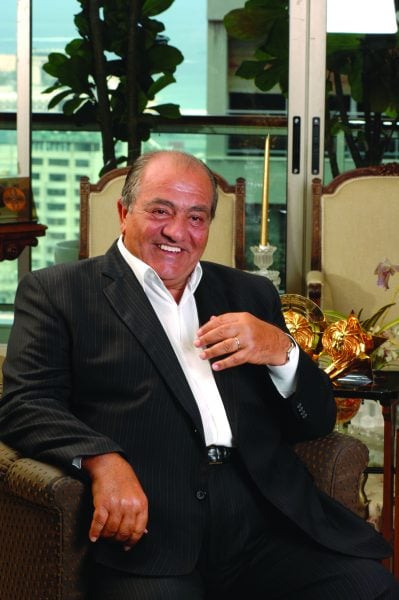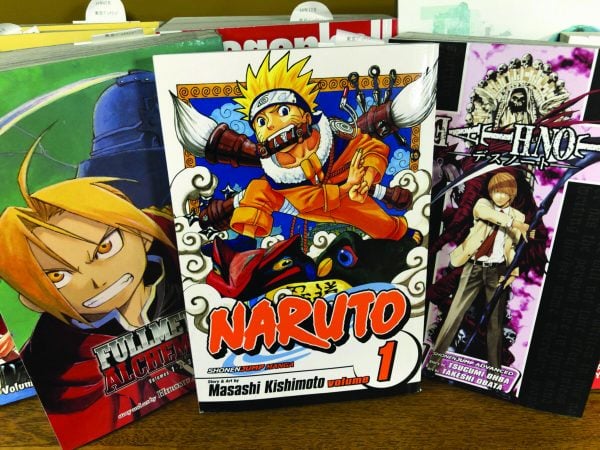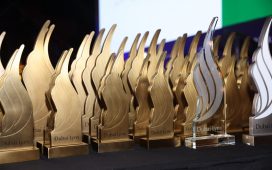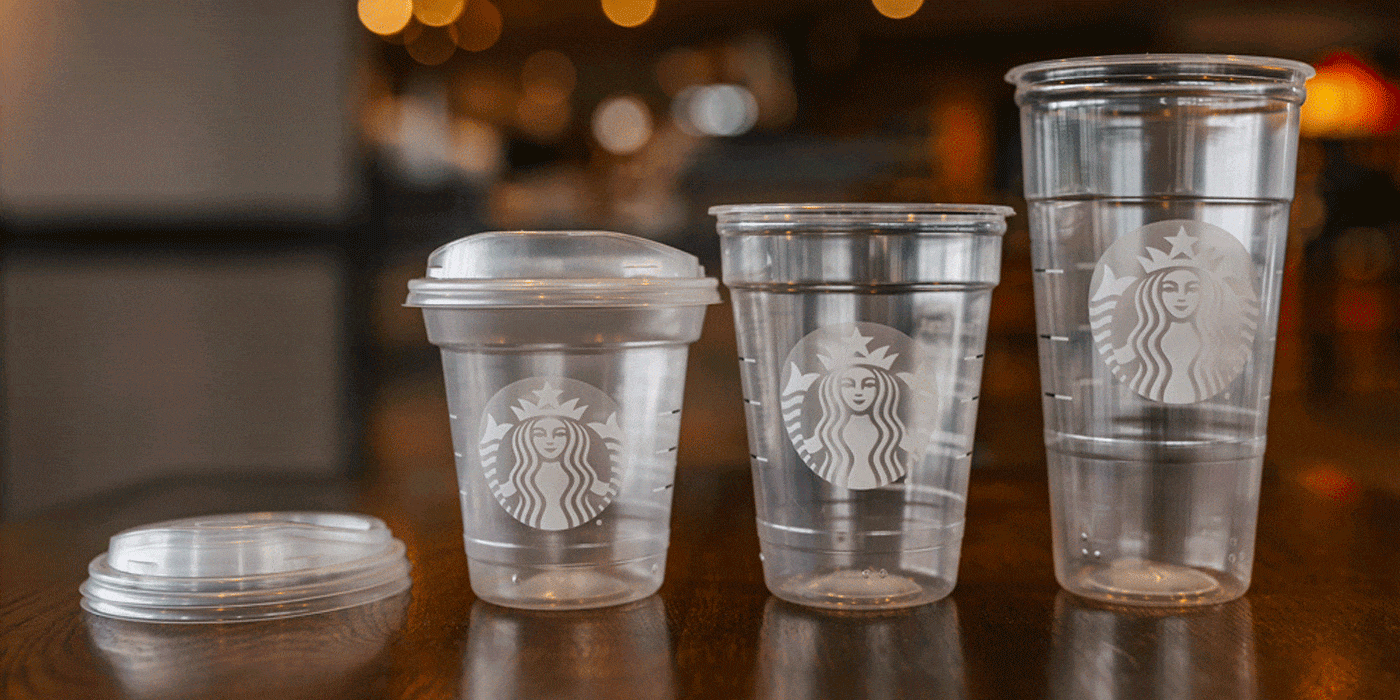 At least this year has not been nearly as challenging as 2020. We are far from back to normal, and the Covid-19 crisis is far from over, but we have at least begun to get used to it. In the region, if not everywhere in the world, many of us have been back to our offices, and Herculean immunisation drives mean that events have been taking place with less social distancing and more masks.
At least this year has not been nearly as challenging as 2020. We are far from back to normal, and the Covid-19 crisis is far from over, but we have at least begun to get used to it. In the region, if not everywhere in the world, many of us have been back to our offices, and Herculean immunisation drives mean that events have been taking place with less social distancing and more masks.
It seems like a world away, but at the start of the year Donald Trump was still in the White House. Although he was waiting for a grown-up, Democrat Joe Biden, to take over as President of the United States, he was still contesting the outcome of last year’s election. The final attacks of Trump’s presidency on ‘fake news’ and democratic institutions continued to affect the world’s relationship with the media and truth, and reached a nadir when a mob of Trump supporters stormed Washington’s Capitol Building on January 6.
While having mercifully more decorum than Trump, Biden’s presidency has been far from smooth, and his decision to fulfil his predecessor’s promise to withdraw US troops from Afghanistan has continued to shape world events and feed an international refugee crisis.
The global economy has been on a rollercoaster as it recovers from the shock of Covid-19’s arrival. It has been lifted by the success of vaccines, and lowered by the emergence of virus variations that are steadily teaching the world how to recite the Greek alphabet.
Adspend has largely recovered, and marketing intelligence service WARC predicts it will rise above pre-Covid levels next year. However, some channels such as out-of-home and radio are taking longer to bounce back, and economic sectors including travel and tourism are still dampened by the ongoing effects of lockdowns and health worries.
There is a changing of the guard in advertising, as the founding fathers of the industry are gradually replaced with new faces.
At the end of last year, Roy Haddad, WPP’s director for the Middle East and North Africa, quietly stood down. Haddad founded the agency that would become J Walter Thompson in the region, and which has now merged with Wunderman Thompson as part of WPP’s ongoing process of consolidation and merging of its portfolio.
At Omnicom Media Group, Elda Choucair, former CEO of that group’s media agency PHD, was promoted from chief operating officer of OMG to CEO, while Elie Khouri, who had re-assumed his position of CEO after the departure of Nadim Samara in October of last year, has resumed his focus on his role as chairman of OMG.
In December, Raja Trad announced that he too was retiring. Trad was the regional chairman of Publicis Groupe, and will be replaced as regional head of the holding company by Bassel Kakish, who has become CEO. Kakish was previously chief financial officer, chief integration officer and co-managing director of Publicis Sapient in the Middle East.
In February, the industry lost a great when Edmond ‘Eddie’ Moutran, the founder of Memac Ogilvy, died at his home in Beirut. Moutran founded his agency in the 1980s and built it up to be the regional powerhouse that produced some of the Middle East’s most iconic work and inspirational talent.
Fresh starts
Last year, 2020, saw a swathe of departures at all levels within the industry, either due to Covid-19 attrition or to the start of the ‘Great Resignation’ caused by the re-evaluation of our priorities brought on by a world-changing pandemic and the introspection of lockdown. This year, some of those who left their posts have been coming back in new guises, including at the helm of new agencies.
Margaret Flanagan, formerly of Asda’a Burson Marsteller, and Lisa King of BCW launched Tales & Heads communications agency, which was soon working with brands including Euronews, SRMG and Dubai Fitness Challenge.
Lucy and Camilla d’Abo, who sold their agency Dabo & Co to Edelman in 2015, in November launched Together, a consultancy dedicated to workplace culture. Lucy, CEO of Together, had joined Hill & Knowlton Strategies as regional director last January, and Camilla – now a non-executive director at Together – had joined Apco Worldwide as managing director in December 2019.
The social sector
Remember Clubhouse? At the start of the year it was the social media story that never was. For a few months the industry – and certain sections of society at large – was abuzz with talk of (and on) the channel. Clubhouse offered audio-only chat rooms where people could discuss, well, anything. In a world suffering screen fatigue after a year of Covid-19 restrictions, the option to just talk and listen rather than typing and reading was a strong draw. But much of the chatter on Clubhouse revolved around people trying to sell things, often themselves. An aural meander through the ‘Rooms’ that were active at any one time would provide a zeitgeist eavesdrop into the topics of the day including cryptocurrency trading and artists – whose ego and financial ambition often outweighed their talent – discussing how they would ‘mint’ a new line of NFTs that were bound to make millions for those first-adopters listening in today.
The roar of conversation on Clubhouse has died down to a background murmur, not helped by connection and audio issues in the region, widely assumed to be due to data throttling of a platform where conversations were unrecorded, ephemeral and hard to monitor for voices of dissent.
Twitter launched a similar competitor to Clubhouse in its Spaces service, which had slightly fewer connection issues but has also failed to take the world by storm.
TikTok continued its meteoric rise among social platforms, and two in three marketers surveyed by WARC said they would further increase their spend next year. TikTok’s ad revenue grew 152 per cent in 2021 and is predicted to grow a further 75 per cent in 2022. Campaign Middle East even joined the platform.
Snapchat has been doubling down on video and augmented reality with innovation and research into two of its tightly interlinked core strengths. As a founding supporter of the On The Record with Campaign Middle East podcast, Snap has widely discussed its plans and lessons in these fields and more. You can listen to those conversations on Anghami or wherever you get your podcasts.
Instagram overtook its sister platform Facebook this year to become the world’s biggest social media channel in terms of advertising spend. The company that owns both, formerly called Facebook itself, rebranded to Meta in October. The company said at the time: “Meta’s focus will be to bring the metaverse to life and help people connect, find communities and grow businesses.” The metaverse, it explained, “will feel like a hybrid of today’s online social experiences, sometimes expanded into three dimensions or projected into the physical world. It will let you share immersive experiences with other people even
when you can’t be together – and do things together you couldn’t do in the physical world.”
Meta has faced user concerns about privacy this year, after users of its messaging app WhatsApp were asked at the start of January to accept new terms and conditions that raised issues about the data that would be shared with the service’s parent company and sister platforms. In October a technical glitch took Facebook, Instagram and WhatsApp offline for six hours, an outage that affected more than 3 billion users around the world.
There has been a cultural shift to the East in 2021, perhaps driven in part by the Olympics being hosted in Japan.
The biggest TV hit of the year was Netflix’s Korean drama Squid Game, and there are signs that Japanese manga comic books are growing in mainstream popularity in the Middle East.
In May, Vox Cinemas signed a deal with Odex, a Japanese film distributor in South East Asia, to distribute anime movies across the MENA region.
In August Saudi Research and Marketing Group (SRMG) launched Manga Arabia and Manga Arabia Kids, to provide Arabic manga content, designed by local creators, on a digital and monthly print magazine platform.
2021 has been another good year for podcasts. Advertising spend on the medium grew by more than 50 per cent according to WARC. Audio-streaming ad spend was up by 28 per cent.
In January Dubai-based podcast network Rising Giants secured $1m in funding, which it estimated to be the largest investment in a regional podcast network to date.
Another local network, Kerning Cultures, in May, made its first acquisition – of year-old Arabic-language show Faslah. The move took the network’s roster of shows to 12, and was described by them as “one of the many moves Kerning Cultures has made towards its vision of building the largest podcast network in MENA”.
Finyal Media, which produces shows including The Code and Millennial Mirrors, signed a partnership with media representative MIS Gulf. Finyal is the first podcast network in the region to have external advertising representation. MIS will give advertisers access to ad spots, sponsorship opportunities, product placement and branded content offerings, including the development and production of podcast shows on a brand’s behalf.
Finyal launched Finyal+ in June on Apple’s new podcast subscription platform. The service allows subscribers to listen to podcasts ad-free.
In July SRMG bought 51 per cent of podcast platform Thmanyah, as part of the group’s new digital-first, multi-platform transformation strategy that it announced in July.
Regional streaming service Anghami continued its growth and announced it would be moving its headquarters from Beirut to Abu Dhabi. It is due to list on the New York Stock Exchange. With 70 million users, including 1.4 million subscribers, it is estimated to be worth at least $220m. It earlier merged with Vistas Media Acquisition Company to facilitate its listing.

Out of balance
In September, Campaign published The MENA Power List. The supplement was an evolution of our long-running Power Essays, where industry leaders tackle topics that affect all of us and give their insights from a position of influence. We limited inclusion on the List to only CEOs and chairpeople of major holding groups, and the heads of major media owners and reps. And although we reached out to the few women who meet these criteria, they weren’t able to participate. The resulting list was all-male, and while it hadn’t been our aim to make a point, the preponderance of Y chromosomes drew criticism and debate about the lack of women at the very top.
Luckily, the future looks more balanced than the present, as we are seeing growth in both the number and strength of initiatives to propel the industry’s many talented women to the positions they deserve.
The United Nations’ Unstereotype Alliance is now a year old in the region, in partnership with the Advertising Business Group (ABG), which is itself celebrating its fifth birthday here. In June the ABG released its Ethical Guidelines for Gender Portrayal in Advertising & Marketing Communication to advance gender equality and women’s empowerment in the UAE. The guidelines address unconscious biases in advertising and how to avoid reinforcing harmful stereotypes.
In March, PRCA MENA and Global Women in PR MENA co-launched Taa Marbouta – a unique, women-to-women mentorship programme and campaign. It not only helps support young women in PR, but in May it released a mandate for men to do their part in helping further the cause.

Mars attracts
When things got too bleak and dystopian down here on our plague-ravaged Earth, 2021 was a year to look to the skies for inspiration and escape. Billionaires Elon Musk, Richard Branson and Jeff Bezos compared the size of their rockets in an attempt to be the first rich white man in space, and the UAE joined an elite group of interplanetary countries when its Hope Probe arrived in orbit around Mars.
On 9 February Hope reached its destination, and UAE marketers – government and private-sector alike – celebrated its arrival with campaigns involving ink, babies, double moons and more.
Minds matter
The Olympics took place in Japan, delayed for a year by Covid-19 and devoid of spectators for the same reason. They saw the world’s most decorated gymnast, the American Simone Biles, withdraw from several events citing mental health issues.
Not long before, Japanese tennis star Naomi Osaka withdrew from the French Open, having refused to take part in press conferences at the event. She too cited mental health as reasons for those decisions.
The two sportswomen helped give further voice to a topic that has been rising up the agenda and affects the advertising industry in many ways.
The Covid crisis continues to put focus on self-care, and our enforced isolation has encouraged even the most extrovert among us to look inwards. This is reflected in brand messaging encouraging consumers to look after themselves. Brands are striving for ‘authentic’ connections to their customers, which means more messaging in a personal-awareness, ‘we care’ vein.
And within agencies more employers are seeing their staff as fragile humans rather than expendable cogs in a corporate machine. The industry is infamous for its culture of hard work, but moves such as shorter workweeks are signs that these rigours are at least being acknowledged.
In July, Arthur Sadoun, CEO and chairman of Publicis Groupe globally, said he was “extremely worried” about the ongoing impact of Covid-19 on the mental health of staff.
However, the Public Relations and Communications Association (PRCA) MENA Mental Health Report, published on World Mental Health Day on October 10, revealed that 57 per cent of PR professionals in the region feel their organisation is doing ‘not enough’ or ‘much less than is needed’ to support their mental wellbeing.
Opening hours
The UAE itself announced a four-and-a-half-day working week for the public sector and schools at the start of December. For much of the year, news had been leaking out about a shift to a Saturday-Sunday weekend in line with most of the western world, and this was confirmed along with a half-day on Fridays to account for the traditional Muslim prayers.
Private-sector companies are not mandated to follow the same timekeeping, but are likely to follow suit for logistical reasons such as parents wanting to share a weekend with their children. The first companies to announce changes have been split between two-day and two-and-a-half-day weekends. The option of a longer weekend will not only help with work-life balance, but will be seen to do so in a way that can be marketed to global companies looking to invest in the region, and – importantly – to global talent that those companies might be looking to attract.
It will also give the UAE a card to play in the quiet but growing competition for regional talent against Saudi Arabia.
The kingdom, long seen as a hardship posting – if a lucrative one – by many expats, is continuing to reform politically, economically, societally and in terms of its image. This year it joined the Formula One Grand Prix circuit, as well as hosting numerous music and cultural festivals. The Neom super-city on the Red Sea is taking shape, and government and private sector clients are bringing big business to regional media, marketing, advertising and communications firms.
In February, Riyadh announced that, from 2024, the public sector would no longer be allowed to contract with foreign firms that do not have their regional headquarters in the kingdom. Despite a fast-growing private sector, the most lucrative contracts within Saudi Arabia are with government entities, so this sends a clear message to international companies wishing to do business there. It also throws down a gauntlet to the UAE, where Dubai has long been the go-to city to headquarter multinationals in the Middle East.
This year companies that announced they would be opening new offices in Saudi Arabia included Vice Media Group, Emaar Entertainment’s Reel Cinemas, Dentsu’s Merkel MENA and influencer marketing agency Vamp, a sister brand of Campaign. Snap is launching a Creator Studio in Riyadh, and another Campaign sister title, What’s On, launched its Saudi edition this year, first in English and then in Arabic as well.
Measures of success
In September, the GCC chapter of the Interactive Advertising Bureau (IAB) released the results of its study into digital advertising spending in the MENA region. It found that the total spent on digital advertising in 2020 was $3.64bn. Earlier in the same month, Publicis Group’s Zenith media agency had released its latest estimates that put overall MENA adspend at $2.4bn in 2020. As with all spend measurements, it is unfair to compare estimates as methodologies, definitions and more differ wildly. Zenith’s digital spend estimates only go back to 2007, in itself an impressively early date for measuring the medium (internet spend back then was $17m; Zenith says that had grown to $1bn by 2020).
The importance of the IAB number is that it was arrived at by an industry-wide body, rather than just one agency or organisation. This means that the methodology should have had more input and insight into different agencies’ figures and estimates, and that the methodology should be more transparent. It should also be more universally accepted, even if it is accepted as one set of numbers that everyone can disagree with.
The IAB found that social channels account for 47 per cent of regional adspend, which exceeds European benchmarks and reflects the strong social media user base in MENA.
Another big measurement story in 2021 was the announcement of Saudi Arabia’s Television Audience Measurement (TAM) project in November. While people meters have been in some other markets around the world for decades, they have been a long time coming to the Middle East. The first data from research firm Nielsen, which has been contracted to run the project, should be available next year.
The regional industry is also making strides towards combating ad fraud. In August TikTok became the latest publisher to achieve TAG Brand Safety certification in the region. Awarded by the Trustworthy Accountability Group (TAG), the certification is a cross-industry initiative to fight criminal activity and strengthen brand safety and transparency in digital marketing.
In November the IAB GCC and the ABG partnered with TAG. Elda Choucair, CEO of OMG and vice-chair of the ABG, said: “As digital investments continue to grow, so does the need for increased vigilance on ad-fraud, brand safety risk and malware. By supporting this initiative to encourage adoption of TAG’s certifications, we hope to drive a more sustainable, transparent and trustworthy industry where advertisers and agencies can be confident in the investments they are making.”
The home front
In November, Campaign’s flagship event, Marcomms360 – Predictions 2022 returned in person after a year in the virtual wilderness. A stellar line-up of speakers gave their predictions and forecasts for the year ahead to an engaged audience at Five Palm Jumeirah Dubai hotel. Afterwards, at an Industry Night party, we presented framed mementoes for a third year to our Marketing Game Changers, those client-side marketing leaders whose actions and insights have made the greatest impact on their brands, their industries and the region’s marketing community over the past 12 months.
Campaign Middle East is proud to be bringing the global Campaign brand’s Agency of the Year to the MENA region in 2022. Campaign’s Agency of the Year – Globals (AOTYG) recognises that you don’t have to be global in scale to be world-class in stature; these awards are open to agencies of all sizes, anywhere in the world, be it a single shop in Dubai, an agency with multiple offices across the Middle East or a fully networked agency with a truly global spread of employees. If you think the achievements of your agency make you the best in the world, we’d love to see you enter. You can find more details of how to do so on our website.
Crucially, these awards do not focus on the creative output of an agency but reward outstanding business performance, agency culture and individual leadership. There will be awards for Best Network Middle East and Africa as well as Best Global Network. Individual agency offices will be rewarded on an international level by discipline: Brand Experience Agency, Consultancy, Creative Agency, Customer Engagement Agency, Digital Innovation Agency, Independent Agency, In-House Agency and Media Agency. There are categories for the best people, staff engagement and initiatives, and top clients and partners.
An upcoming MENA Agency of the Year Awards, in line with Campaign Middle East’s sister titles in Asia Pacific, the US and the UK, will be launched next year. These awards too will be audited by PwC.
We will also continue to host our podcasts, events, perhaps some webinars and maybe a drinks night or two. You can read our articles on the website at campaignme.com and in the magazine. Sign up to our newsletters and follow us on social. We are everywhere the industry is, and we’re grateful that you choose to join us.











